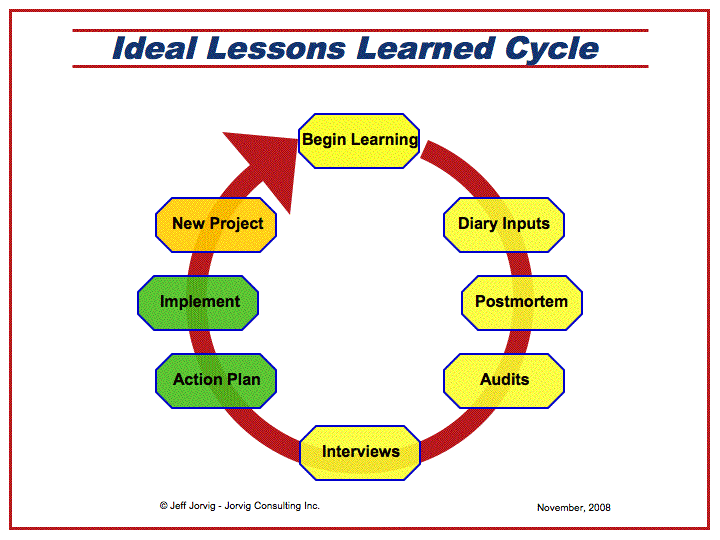 In one of my previous jobs as a Project Manager, I was assigned to create a process for examining the outcome of our projects. The intent was for each project to have a way to examine what happened during the life time of the project (from planning to execution to closeout). We wanted to understand what had gone well so we could repeat it in the future and experience continued success. More importantly, we wanted to also understand what had gone wrong so we could avoid failing in our projects. We had to come up with a name for this process. At first, we wanted to call it a “Post Mortem” process but some felt it would it be too depressing (and perhaps too appropriate for some projects). So we went with a more boring name: “Lessons Learned“.
In one of my previous jobs as a Project Manager, I was assigned to create a process for examining the outcome of our projects. The intent was for each project to have a way to examine what happened during the life time of the project (from planning to execution to closeout). We wanted to understand what had gone well so we could repeat it in the future and experience continued success. More importantly, we wanted to also understand what had gone wrong so we could avoid failing in our projects. We had to come up with a name for this process. At first, we wanted to call it a “Post Mortem” process but some felt it would it be too depressing (and perhaps too appropriate for some projects). So we went with a more boring name: “Lessons Learned“.
As I look at some of the most recent headlines around finances, I wonder if we have learned any lessons from the “Great Recession” of 2008. If you strip away all the drama induced by the media and opportunistic politicians, the reasons for the downfall were simple: People borrowed more on assets than they should have (whether you consider houses, cars, or credit cards) based on their income. They did not have savings to prepare for the loss of income so they had to extend their credit to the maximum. On the lending side, many banks driven by greed, extended credit to people when good old lending guidelines would dictate otherwise. But when things got tight, those same banks looked out for themselves: they started tightening credit lines and looking for every possible way to protect their bottom line including increasing fees and interest rates.
Fast forward to 2011, less than 3 years later. If you look across our nation it seems we did not learn a single lesson from 2008. You want some evidence? As you may know, the NFL has locked out its players since they have not been able to resolve their labor dispute. According to a recent report: “Barely into the second month of the lockout, there’s already been some disturbing news on the financial front for players. Players from at least 16 teams have at least shown interest in taking out short-term loans with high interest rates and fees“. Players that make hundreds of thousands of dollars every year are not prepared to lose even one month’s income before having to rely on credit. Is that were you are today? What would happen if you lost your income today?
Then there is another report that indicates the 5 cities with the most credit card debt that came out just last week. Two of those are in Texas: San Antonio at #1 and Dallas at #5. People still think credit cards are the means to financial prosperity. The report also indicates that credit card debt accounts for 17% of the income of many households. Is that where your household is today?
And one more piece of evidence: On April 18, S&P had warned that “unless the U.S. gets its fiscal house in order by 2013, S&P would do what was once unthinkable: cut the U.S. credit rating and codify what many already believe — U.S. debt is no longer one of, if not the, safest investments in the world.” I guess there IS such a thing as “too much debt” ($14T and counting). So the government is not coming to help anyone.
So what is it going to take? What else needs to happen before you take action? You may not be able to solve the NFL labor dispute and you probably don’t have the means to slow down the credit card usage in San Antonio or Dallas. And I am guessing you don’t have $14T laying around to get the US out of debt. But you do have the means and the ability to get your household in order:
- Stop spending all the money that comes into your home. Learn to live on less than you make. Make a plan for your money.
- Stop mistaking a credit line for an emergency fund. Make savings a priority. It will not happen by accident.
- Stop thinking that debt is your ticket to financial success. You can live without credit cards. Learn to delay pleasure and save for large purchases.
Don’t wait until it is too late. If you don’t take action today, someone will have to do a “post mortem” on your finances.
